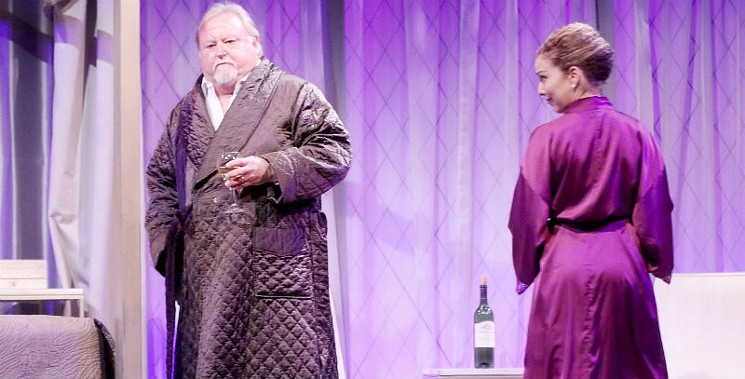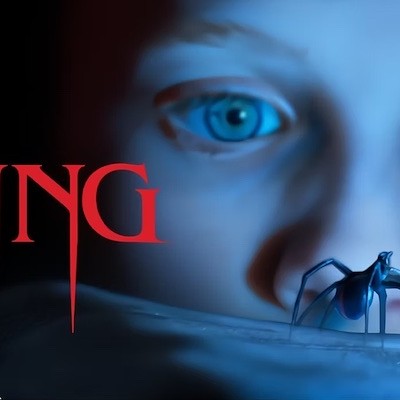
Rutherford Cravens and Lisa Villegas in The Last Wife at Main Street Theater
Photo by Pin Lim/Forrest Photography
Look to your six predecessors. First wife, Spanish Catherine of Aragon, married to Henry's older brother Arthur. When Arthur died, Henry moved in. Catherine remained married the longest, and bore the young king his first living heir, daughter Mary, who would reign intemperately after Henry's death and forever be tarred by history as the notorious “Bloody Mary.” Without producing a male offspring, though, Henry annulled the marriage, forever severing ties with the Catholic Church. Then came sprightly Anne Boleyn, sister of Henry's mistress who caught his gimlet eye. Unable to bear him a son, she was later beheaded on trumped-up charges of adultery and witchcraft. But she did bear him the future Elizabeth I, England's most illustrious ruler.
Then middle-class Jane Seymour, perhaps his favorite, took his fancy and fulfilled Henry's only request in a wife – she gave him the male heir he so prodigiously wanted. But she died after giving birth. Dull Anne of Cleves lasted six months in the royal bedchamber, unconsummated, before she was sent packing with her marriage annulled. She was quickly replaced by randy Catherine Howard, cousin of Anne Boleyn, who became unfaithful even before the marriage, and, once her indiscretions were exposed, was duly executed.
And finally there's feisty Katherine Parr, who outlived gouty old Henry, her third husband up till then, later to marry her old flame, the ambitious Thomas Seymour, Lord Admiral and brother of revered Jane and reputed lover of teenage Elizabeth.
This merrie band of scandalous bed-hoppers reads like a renaissance “Housewives of Hampton Court.” No one is faithful for very long, and everyone's looking over his/her shoulder for the heavy footfalls of the absolute monarch, who could in a word seal your doom or bestow a lavish estate, usually from a previous liaison gone sour. It's all so now and trendy.
Main Street Theater continues its season's ripe romp through Tudor times with the regional premiere of Kate Hennig's The Last Wife (2015), a most feminist take on those most testosterone-filled years. If you've seen Main Street's stirring and inky sequels Wolf Hall and Bring Up the Bodies (both penned by Mike Poulton from the international bestsellers by Hilary Mantel), you know what a tangled web those Tudors delighted in. Ahh, deception, torture, skulduggery, misted through candlelight and velvet farthingales.
As associate artistic director of Ontario's prestigious Shaw Festival and with a decades-long career as an actress with London's Royal Shakespeare Company and Canada's Stratford Festival, Hennig knows her way around the theater. Her view on Henry and Kate is much more contemporary, anachronistically vernacular, and replete with swathes of gender studies. We are up close and personal to these bodies.
The characters may say “sire” and “majesty,” but they're swathed in a '30s glamour thanks to Liz Freese, set; J. Mitchell Cronin, lighting; Macy Lyne, costumes; Yezminne Zepeda, sound. They live in swanky digs that could handily double for a Noel Coward comedy. In a somewhat timeless mode, the four-poster bed, tuffed-leather divans, and hotel rose-window ceiling panel, would appropriately suit Carole Lombard and Fredric March during the glory days at Paramount with Ernst Lubitsch. The men wear coats and turtlenecks, not doublet and hose, and the women lounge in luxe cocktail gowns or chic grunge.
Teen princess Elizabeth's sparkle shoes and patterned stockings nod to today's Teen Vogue and a one-percenter's conspicuous consumption. (Clara Marsh, recent graduate of HSPVA and soon to depart for the University of Minnesota/Guthrie theater program, makes a convincing young Bess, queen-in-waiting, as she shuttled back and forth from dad to step-mom in this ruthless game of English thrones. Conflicted, she's wise beyond her years, impressionistic, but with empathetic girlish teen spirit. Jackson Doran rounds out the royals-to-be as Eddie, ill-fated Edward VI. Naive and innocent, Doran has our sympathy from the start. He's a natural on stage, full of easy charm and boyish high jinks.)
Of course, updating the Tudors isn't as shocking as shoehorning modern political sensibility onto these 16th-cenutry chauvinists to keep them relevant.
Kate (Lisa Villegas, canny and aggressive) might as well carry a protest placard declaring I Am Woman, along with her power-woman briefcase, when pleading her case to marry the old king. For all her intelligence and wit and considerable charm in taming Henry's wild beast, she must fall back on the old ways that predate the Bible: She uses her body. Within reason she gets what she wants, but her tactics are quite at odds with Hennig's pro-feminist slant.
This contradiction, which is built in, sets Kate adrift, for we never understand what's really driving her. Although this is most definitely Kate's story, what Parr actually accomplished in history – and she did quite a lot for the English succession, keeping Henry placated and educating his children – doesn't quite square with what Hennig wants us to grasp. Everyone's a bit too knowing, too prescient, too in touch with the 21st century. We hear the author, not Kate, and that takes a great deal of sting out of the drama and replaces Kate with a cipher.
Hennig pares down the convoluted history into more digestible soap, dropping characters like Thomas's brother Edward, 1st Duke of Somerset – who paved the way for Thomas's eventual downfall and loss of head – and spicing up others like Mary Tudor, keeping the eldest daughter skulking through the palace to drip sarcasm and wasp venom. Joanna Hubbard makes a tart meal out of Mary's backseat driving.Old pro Rutherford Cravens could play Henry VIII in his sleep.
tweet this
Old pro Rutherford Cravens could play Henry VIII in his sleep. The part fits him like a deerskin glove, as he brings this wasted, haunted man to life. Like Lear on the blasted heath, he can bluster with the best, or insinuate his intentions with but a raised eyebrow or the flick of a finger as he embroiders in his study. He knows he's dying; he also knows Kate doesn't truly love him. It's a match made, if not in heaven, then here on earth. “I need someone like you,” he states early in the play, “I'm old, cranky, and my leg hurts like hell.” He gets his command, albeit somewhat compromised by Kate's lawyerly provisions for the marriage bed. But Hennig likes the childlike king, and Cravens morphs his character into a colorful portrait as if by Holbein, spruced up by Warhol.
Especially memorable is Blake Weir's opportunist Thom Seymour, the palace's cock of the walk. Eye candy for the ladies of the court, he will bide his time schmoozing the damsels, canoodling with Katherine and then Elizabeth, and waiting, as someone says, like a spider in the corner, to parlay his affections into a prominent royal position. He will get that, but not quite in the manner Hennig depicts. Weir was an obstreperous, boastful Henry VIII in Main Street's Wolf Hall and Bring Up the Bodies, and he brings shadows and vigor to Thom, who's out of his league among these more seasoned scorpions.
Director Robin Robinson keeps things apace, but Act I drags as it spins its wheels trying to gain momentum through the salient talking points. Act II moves with greater force, but feels rushed as Hennig brings her drama to a close just when things are getting het up. “It's been a rough few weeks,” Kate says to young Bess. No kidding. Both Henry and Kate die offstage, and there's an epilogue at the grave with Mary and Bess to tie up loose ends left dangling by Hennig.
King Henry VIII, though, got his fervent desire. Son Eddie ruled as Edward VI, but died at age 16, his short reign overseen by Protector of the Realm, Edward Seymour, Thom's brother and brother-in-law to the dowager queen Kate. Then all hell broke out. But that's another play.
The Last Wife continues at 7:30 p.m. Thursdays, Fridays and Saturdays; and 3 p.m. Sundays through August 13. Main Street Theater, 2540 Times Boulevard. For information, call 713-524-6706 or visit mainstreettheater.com. $36 to $43.







